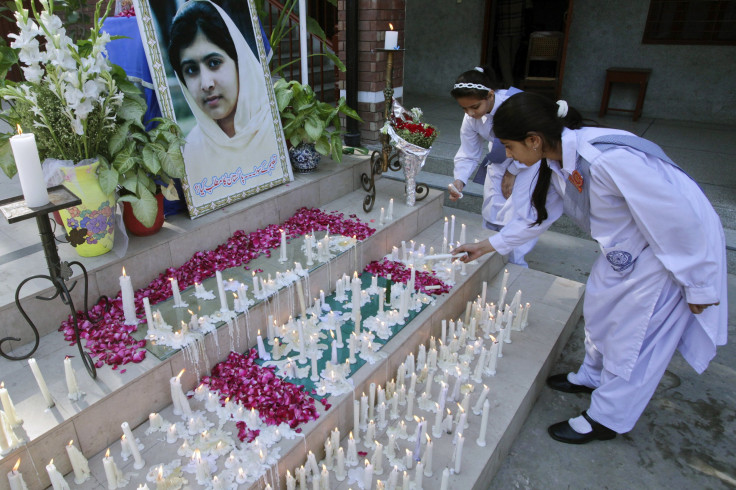Tens of Thousands Support Peace Prize For Malala, But Not All Agree

Malala Yousafzai has won plenty of awards for her stand against extremist militants in her native Pakistan, but she hasn’t won the biggest prize of all.
Now, tens of thousands of people around the world are trying to change that. They argue that next year’s Nobel Peace Prize should go to the 15-year-old women’s’ rights champion, who is now recovering from a violent attempt on her life.
Malala first came to the attention of Western media in 2009, when she wrote a blog for the BBC and was filmed for a New York Times documentary. She was 12 at the time, and had been working for girls’ educational rights in one of the most conservative areas in Pakistan.
On Oct. 9 this year, Pakistani Taliban militants tracked her down. They stopped her school bus, got on board and opened fire, shooting Malala twice in the head and neck and injuring two other classmates.
The assailants got away, and Malala was airlifted to an intensive care unit in Peshawar. On Oct. 15, she was transferred to a UK hospital where she has been recovering ever since. Her progress so far is encouraging; there is no indication of major brain damage, and Malala is now able to walk, talk and read.
By now, Malala is no stranger to recognition. In 2011, she was the first winner of Pakistan’s annual National Peace Prize for her fearless work advancing girls’ education. Since the attack, she has been lauded by high-profile figures the world over, from United Nations Secretary General Ban Ki-Moon to American pop singer Madonna. Nov. 10 has been declared ‘Malala Day’ by the Pakistani government.
But a new petition, authored by UK citizen Shahida Choudhary and available at Change.org, argues that a Nobel Peace Prize should be next.
Choudhary, who was born in Britain, was sent to Pakistan by her family at the age of 16 for an arranged marriage. She escaped back to the United Kingdom, and argues that a prize for Malala would help the world appreciate the plight of females who feel constricted by religious conservatism, in Pakistan and elsewhere.
“A Nobel Peace Prize for Malala will send a clear message that the world is watching and will support those who stand up for gender equality and universal human rights, including the right to education for girls,” Choudhary writes.
As of this writing, over 130,000 people have signed the petition; it is sure to pass its goal of 150,000 signatures.
Despite its overwhelming support, a Nobel Peace Prize for Malala would not be without controversy.
You’d be hard-pressed to find people who doubt Malala’s bravery, but many take issue with the fact that she has been singled out for her suffering. She is only one of many innocent people to endure violence in Pakistan in recent years, especially in the volatile northwestern region, which is plagued by Taliban aggression, army-insurgency clashes, and drone strikes from the United States.
According to data from the Bureau of Investigative Journalism, 350 U.S. drone strikes since 2004 have killed up to 3,378 people in Pakistan. Between 475 and 885 of those were civilians, and 176 were children.
By highlighting Malala’s injury at the hands of the Taliban but neglecting to publicize the ongoing loss of life due to U.S. strikes, say critics, the West is spinning the narrative to its advantage.
Fazal-ur-Rahman, a far-right Pakistani politician and cleric who was known for his ties to the Afghani Taliban, is one of those critics. He noted last month that “Malala Yousafzai is our daughter,” according to Pakistani media outlet The International News.
"Some people are using the issue of attack on Malala for gaining political mileage," he said, adding that “we are asked that [our Muslim scholars] should condemn the attack on Malala Yousafzai, but first they should come forward and denounce the attacks on our madrassas.”
Charges like these will be considered by the Nobel Committee, which has already begun its deliberations over the recipients of the 2013 prize. Nominations will be accepted until February, and the winners will be announced in October of next year, ahead of the actual ceremony in Oslo, Norway in December.
Meanwhile, in the United Kingdom, Malala has along recovery ahead of her. But a recent video, released by the Queen Elizabeth Hospital in Birmingham, shows her more animated than she has been in any such footage since her attack: she sits beside the bed, clutching a teddy bear and glancing shyly at the camera as her father Ziaduddin Yousafzai reads aloud from cards sent by well-wishers from around the world.
“Malala is recovering well, and wants me to tell you she has been inspired and humbled by the thousands of cards, messages and gifts that she has received,” says Ziaduddin.
“She wants me to tell everyone how grateful she is, and [she] is amazed that men women and children from across the world are interested in her well being."
© Copyright IBTimes 2024. All rights reserved.






















